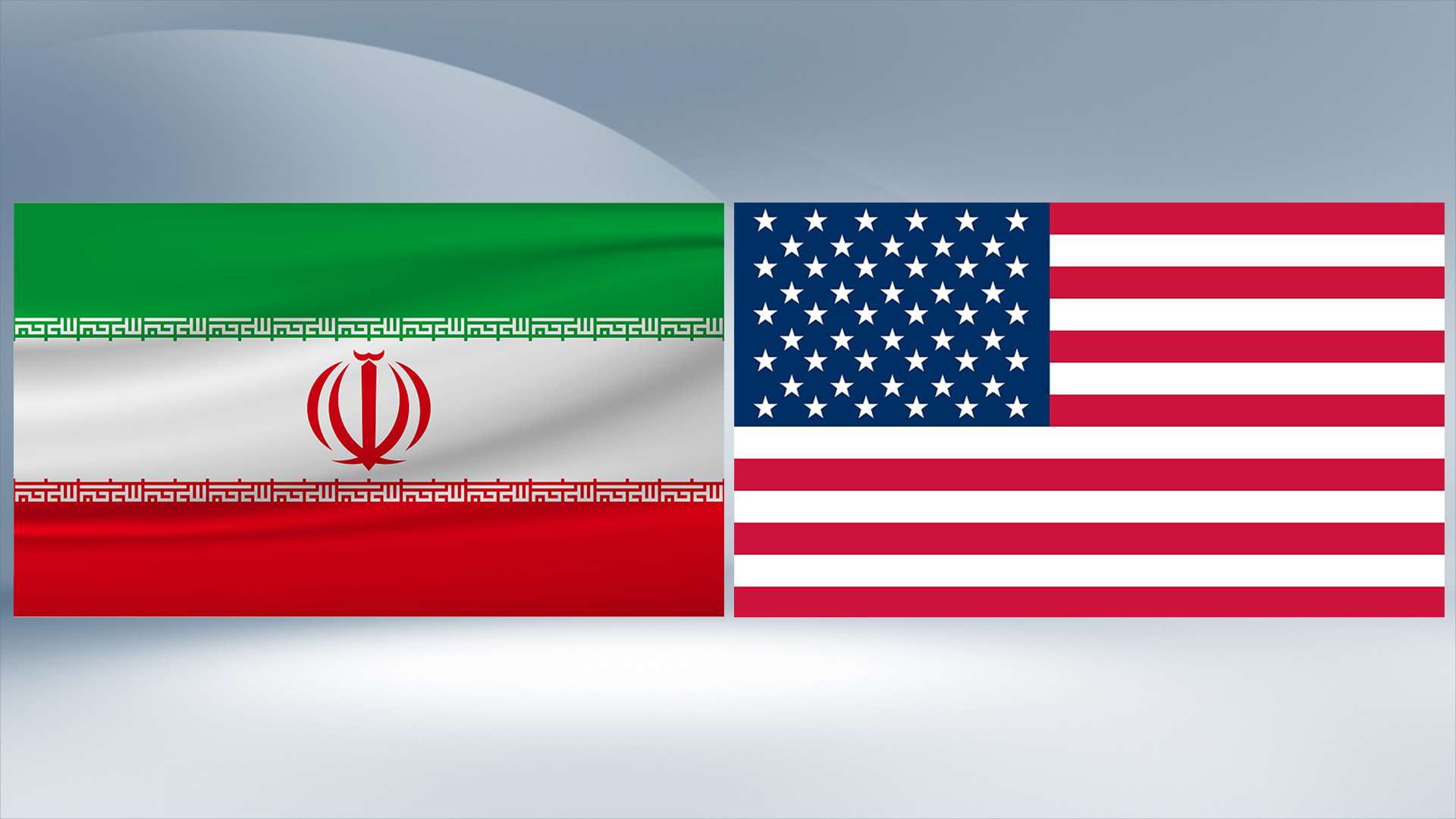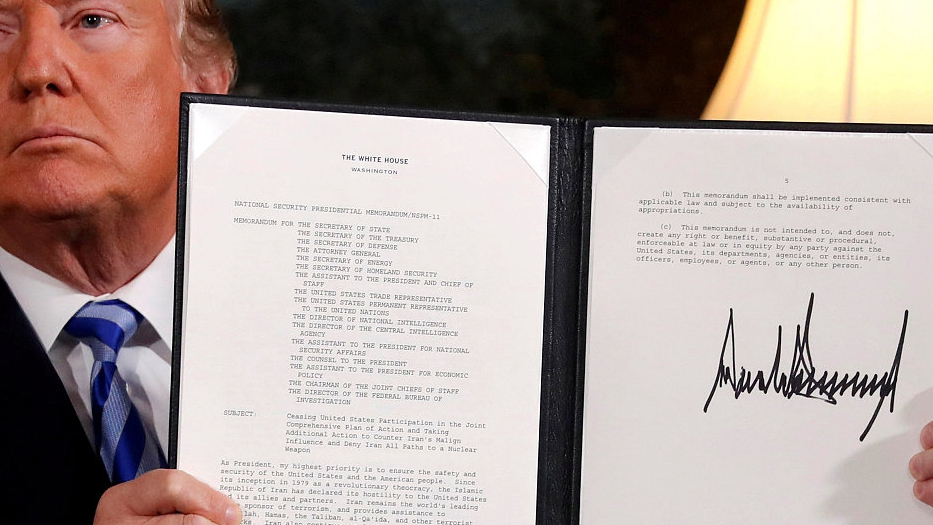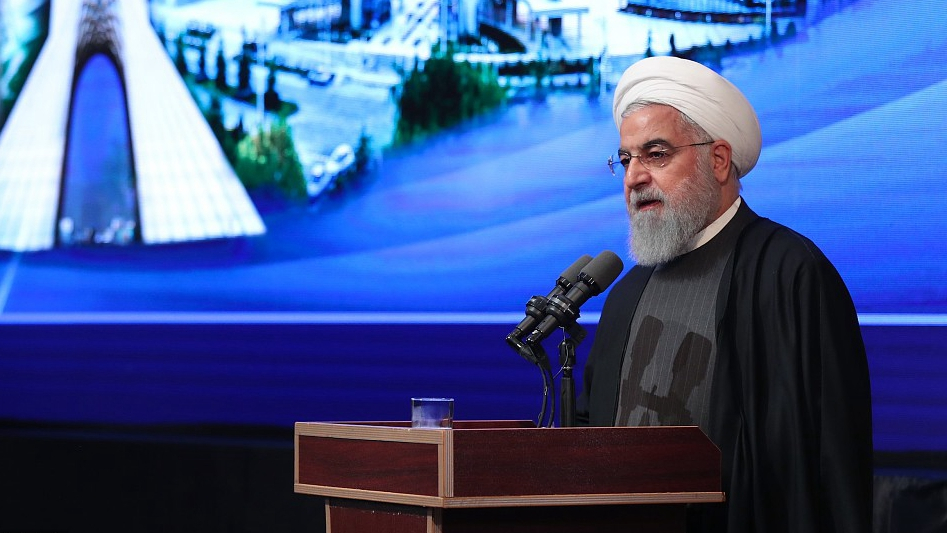
Opinion
12:28, 24-Feb-2019
Why Iran nuclear deal is on life support
Updated
21:01, 24-Feb-2019
Ghanbar Naderi

Editor's note: Ghanbar Naderi is an Iranian journalist, a current affairs commentator, a documentary filmmaker, and a member of the Writers' Guild of Great Britain. The article reflects the author's opinions, and not necessarily the views of CGTN.
On May 8, 2018, President Donald Trump withdrew from the 2015 Iran nuclear deal he had long scorned.

U.S. President Donald Trump holds up a proclamation declaring his intention to withdraw from the JCPOA Iran nuclear agreement after signing it in the Diplomatic Room at the White House in Washington, D.C., U.S., May 8, 2018. /VCG Photo
U.S. President Donald Trump holds up a proclamation declaring his intention to withdraw from the JCPOA Iran nuclear agreement after signing it in the Diplomatic Room at the White House in Washington, D.C., U.S., May 8, 2018. /VCG Photo
The decision unraveled the signature foreign policy achievement of his predecessor Barack Obama and isolated the United States from its Western allies.
It's not that hard to weigh in with reasons why Trump scrapped the Iran deal, also known as the Joint Comprehensive Plan of Action (JCPOA), with China, Russia, the United States, Britain, France, and Germany.
He framed his decision as the fulfillment of a bedrock campaign promise and as the act of a deal-maker dissolving "a fatally flawed agreement." He claimed that "the deal allowed Iran to continue enriching uranium and - over time - reach the brink of a nuclear breakout."
The truth is that the JCPOA and other international agreements to which Iran has committed itself also prohibit the development of such weapons.
Iran is a signatory to the Nuclear Non-Proliferation Treaty and has committed itself to ratifying the International Atomic Energy Agency's Additional Protocol in 2023.
The former restricts Iran from ever developing nuclear weapons, and the latter grants international inspectors wide access to monitor its nuclear-related activities.
However, for Trump, this was a personal issue. He had every intention to take aim at practically every one of his predecessor's signature achievements.
Within a week of his inauguration, he pulled the U.S. out of the Trans-Pacific Partnership trade negotiations, killed the Paris Agreement on climate change mitigation, all Obama-era protections for undocumented immigrants, and re-imposed sanctions and travel restrictions on Cuba. He then put the Iran nuclear deal on life support and re-imposed unilateral sanctions.
In response to Trump's unpredictability, the emboldened hard-line forces in Iran test-fired a ballistic missile on December 2018.
Iran said the missile launch was intended to display its “deterrent power” and “all-out readiness to counter any threat,” but Washington didn't buy it.
Iran's ballistic missile tests were not a violation of the deal because Iran is literally "called upon not to undertake any activity related to ballistic missiles designed to be capable of delivering nuclear weapons, including launches using such ballistic missile technology," according to the text of the UN Security Council Resolution 2231 (hereafter UN 2231).

Iranian President Hassan Rouhani /VCG Photo
Iranian President Hassan Rouhani /VCG Photo
As Washington unnecessarily walked out of the deal, reinstated all the sanctions they had waived, and imposed additional economic penalties, the provoked escalation between Tehran and Washington could last for a period of time.
If Iran's ballistic missile test goes against the constructive spirit of the UN 2231, so does Washington's series of irresponsible actions.
An innate distrust of multilateralism in general, always being so dead against Iran, or putting it “on notice” and calling it "a deliberative process” cannot get U.S. attention either.
Therefore, rather than pursuing additional unilateral sanctions at this time or taking the draconian step of suspending the sanctions relief, the Trump team should consider other effective means: Returning to the deal and lifting unilateral sanctions, strengthening multilateralism, and supporting efforts to negotiate regional ballistic missile limits - as no other country in the Middle East is subject to ballistic missile limits.
Given the tensions between Tehran and its neighbors, it probably won't stop developing its ballistic missile capabilities. Actually, Iran seeks better ties with its neighbors and is willing to abide by missile limits, but only as part of a regional effort to ban longer-range ballistic missile systems.
President Trump could encourage and support that. Any other decision will be a profound mistake, including the unilateral and isolationist policies he is pursuing with the euphemism "America First" and/or standing against the global trend for cooperation in pursuit of shared peace and prosperity.
At any rate, Trump is standing on the wrong side of history.
He cannot force others to follow Washington out of the landmark accord. This will only isolate the U.S. further and create an "unnecessary crisis" that could lead to war with Iran.
Any doubters should ask a majority of Americans who are still in favor of staying in the deal, or 600 world leaders and delegates from various political, commercial and civil backgrounds that attended this year's Munich Security Conference in Germany.
(If you want to contribute and have specific expertise, please contact us at opinions@cgtn.com.)

SITEMAP
Copyright © 2018 CGTN. Beijing ICP prepared NO.16065310-3
Copyright © 2018 CGTN. Beijing ICP prepared NO.16065310-3